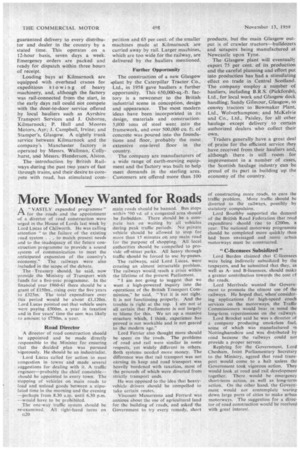More Money Wanted for Roads
Page 142

If you've noticed an error in this article please click here to report it so we can fix it.
A" VASTLY expanded programme" for the roads and the appointment of a director of road construction were urged in the House of Lords last week by Lord Lucas of Chilworth. He was calling attention " to the failure of the existing road system . . . to match present needs and to the inadequacy of the future construction programme to provide a sound system of communication to meet the anticipated expansion of the country's economy." The railways were also included in the scope of the debate.
The Treasury should, he said, now provide the Ministry of Transport with funds for a five-year programme. In the financial year 1960-61 there should be a grant of £150m., rising over the five years to £325m. The total expenditure over this period would be about £1,120m. Lord Lucas pointed out that vehicle users were paying £500m. a year in taxation and in five years' time the sum was likely to amount to £750m. a year.
Road Director
A director of road construction should be appointed and be made directly responsible to the Minister for ensuring that the decided plan was pursued vigorously. He should be an industrialist.
Lord Lucas called for action to ease congestion in towns and made several suggestions for dealing with it. A traffic engineer—probably the chief constable— should be appointed in every town. The stopping of vehicles on main roads to load and unload goods between a stipulated time in the morning and the evening —perhaps from 8.30 a.m. until 6.30 p.m. —would have to be prohibited.
The one-way traffic system should be re-examined. All right-hand turns on G20
main roads should be banned. Bus stops within 100 vd. of a congested area should be forbidden. There should be a complete ban on waiting by all vehicles during peak traffic periods. No private vehicle should be allowed to stop for more than 15 minutes on any main road for the purpose of shopping. All local authorities should be compelled to provide off-street parks. All heavy through traffic should be forced to use by-passes.
The railways, said Lord Lucas, were creating an almost intractable problem. The railways would reach a crisis within the lifetime of the present Parliament.
"I am not going to suggest that we want a high-powered inquiry into the operations of the British Transport Commission," he said. " Yet it is not right. It is not functioning properly. And the trouble is right at the top. I am not at all certain that Parliament is not largely to blame for this. We set up a massive structure which, I think, experience has proved is not workable and is not geared to the modern age."
Lord Ferrier also thought more should be spent on the roads. The problems of road and rail were similar in some respects, yet widely different in others. Both systems needed more money. The difference was that rail transport was not earning its keep and road transport was heavily burdened with taxation, most of the proceeds of which were diverted from strictly transport ends.
He was opposed to the idea that heavy. vehicle drivers should be compelled to take certain routes.
Viscount Massereene and Ferrard was anxious about the use of agricultural land for the building of roads, and asked the Government to try every remedy, short of constructing more roads, to cure the traffic problem. More traffic should be diverted to the railways, possibly by statutory compulsion.
Lord Boothby supported the demand of the British Road Federation that road expenditure should rise to £200m. year. The national motorway programme should be completed more quickly than had been envisaged and more urban motorways must be constructed.
"C-licensees Subsidized" Lord Burden claimed that C-licensees were being indirectly subsidized by the taxpayers, and he submitted that they, as well as Aand B-licensees, should make a greater contribution towards the cost cf the roads.
Lord Merrivale wanted the Government to promote the utmost use of the railways. He hoped that, when considering applications for high-speed coach services on the motorways, the Traffic Commissioners would bear in mind the long-term repercussions on the railways.
Lord Brocket said he was a director of a company producing smokeless fuel, some of which was manufactured m Nottinghamshire and was distributed by road because the railways could not provide a proper service.
Replying for the Government, Lord Chesham, Joint Parliamentary Secretary to the Ministry, agreed that road transport would come to a halt unless the Government took vigorous action. They would look at road and rail development together. There would be emergency short-term action, as well as long-term action, On the other hand, the Government would not contemplate tearing down large parts of cities to make urban motorways. The suggestion for a director of road construction would be received with great interest.
































































































































































































































































